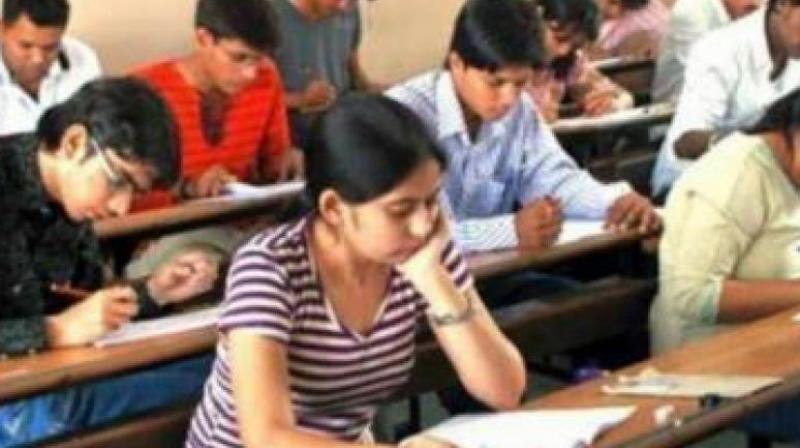How deeply ingrained is corruption in higher education?
Rigged VC appointment process main reason, says sr prof.

Chennai: Even as the state government is trying to clean up the mess in higher education by launching probe against two former vice-chancellors and arresting a sitting vice-chancellor facing corruption charges, the octopus of corruption has already spread its strangling tentacles in every possible corners of state universities, so much so the extraordinary efforts of the government seem too little.
In an unprecedented move, the Directorate of Vigilance and Anti-Corruption arrested A.Ganapathi, vice-chancellor of Bharathiar University, while taking bribe on February 3. The two former vice-chancellors of the university G.James Pitchai and C.Swaminathan are also under the scanner of DVAC on corruption allegations.
It has also conducted raids at 13 places associated with M.Rajaram, former vice-chancellor, Anna University and P.Vanangamudi, former vice-chancellor, Tamil Nadu Dr Ambedkar Law University, in connection with corruption on March 22.
One of the main reasons the corruption in universities is that the appointment process of vice-chancellors was rigged. “The asking rate has been increasing over last 15 years from Rs 50 lakh to Rs 50 crore. Any amount has been suggested as the investment for three years tenure of vice-chancellor,” senior professors said.
It was incredible to believe that the academicians have the wherewithal to raise the huge money. “So, the VCs have been sponsored by vested interests and stakeholders. Appointing vice-chancellors seeing their bribe as seed money which will fetch a substantial return on investment for themselves and their sponsored stakeholders,” some professors said.
Over the years, the contractors and a group of affiliated colleges are willing to invest in favourable VCs. “There are even well-documented incidents where the brokers arranged the loan to prospective VC candidates to pay the bribe during some previous Governor's period,” they alleged.
On the positive note, the professors said that the appointment of vice-chancellors have been made based on merits in the past one year.
M.Anandakrishnan, former chairman, IIT Kanpur, said, “Corruption in academic institutions is far more dangerous than any other corruption as it affects society in a bigger way. There should be zero tolerance policy for corruption not only at vice-chancellors level but also for other levels of corruption.”
“Everyone knew that Mr.Rajaram has paid money to become the VC to the former minister. He also collected money from affiliated colleges. He collected money left and right for appointing the faculty members. It was the open secret. I am wondering why the government could not be intervened at that stage and prevented it,” he said.
He also demanded more transparency in the functioning of VC search committees and urged the committees to reveal the details of VC applicants and shortlisted candidates.
Anna University former vice-chancellor E.Balagurusamy welcomed the recent actions against the former vice-chancellors terming it “good initiative”.
“The government should not stop only with the Rajaram and Vanangamudi. It should to go after all corrupt VCs in the other universities as well,” he urged.
He further said, “The corruption has happened in appointments, purchases, tenders and distance education. There are frauds in admissions and awarding PhDs in many universities including Anna University. We need a detailed probe and the government has to do some serious work if it intends to root out the corruption.” He also said corruptions have taken place during the tenures of previous vice-chancellors of Anna University P.Mannar Jawahar and D.Viswanathan as well.
“Allegations against the vice-chancellors and others have been piling up over a period of time. But the conviction rate is negligible and poor,” professors pointed out.
Apart from Periyar University, two other universities Madurai Kamaraj University and Manonmaniam Sundaranar University also facing large-scale corruption allegations. In Periyar University, former registrar Angamuthu has committed suicide and he blamed a former VC for his suicide.
N.Pasupathy, vice-president, Association of University Teachers (AUT) demanded stringent punishment for the persons who indulged in corruption. “It’s a good beginning. But the government should ensure maximum punishment for the persons who are facing corruption cases. Such punishments alone will deter others from corruption,” he said.
“The corruption cases are not being pursued with the same determination from the beginning to the end,” he urged.
“The higher education department has sought the explanation from Periyar University about the fake certificates given by 20 faculty members last year. But, still, the university has not given any reply to the letter,” he said.
A.R. Nagarajan, adviser, NET SLET Association, has urged the Governor to recommend these corruption cases to be enquired by central agencies. “The DVAC cannot probe the ministers and others who involved in corruption. To conduct the fair enquiry, the cases should be handed over to central investigation agency,” he said.

